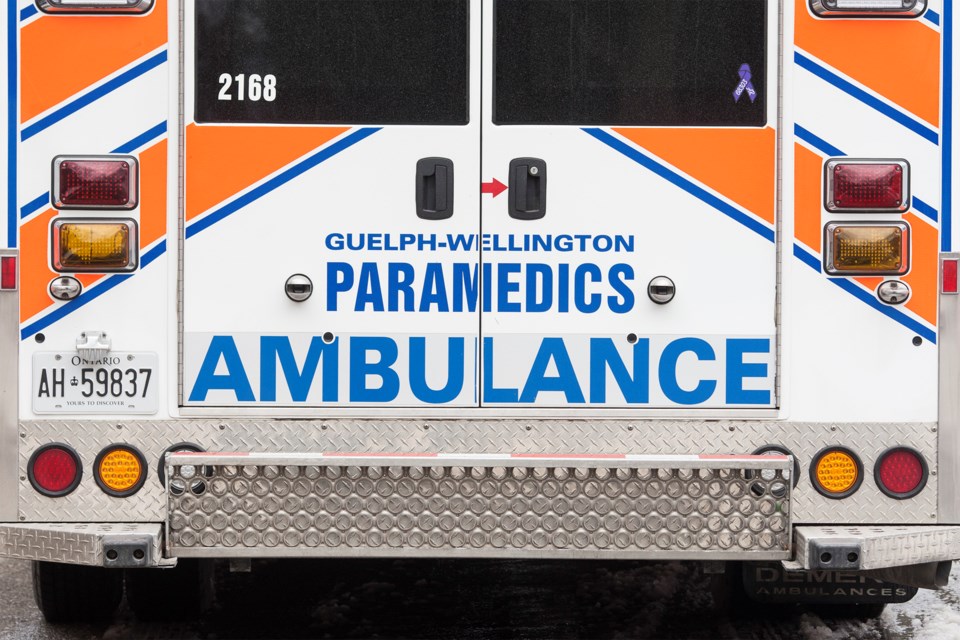A Guelph man could still be alive today had emergency services not intentionally waited before responding to a frantic 911 call from his wife in 2023.
That claim, along with allegations of negligence, is at the centre of a $2.5 million Guelph lawsuit recently filed against local emergency responders, emergency call centre operators, various levels of government and others
“(The man) died as a direct result of the defendants’ misconduct. (His) medical condition was exacerbated by the delayed response and negligence of the defendants, ultimately leading to his death,” reads the statement of claim.
“The delay from the time the 911 call was placed to the arrival of medical personnel deprived (him) of life-saving interventions that could have prevented his death.
“(The man’s) estate claims damages for the immense pain and suffering endured … in his final moments.”
None of the allegations have been tested or proven in court.
No statements of defence have been filed at this time, courthouse staff told GuelphToday.
“Since this matter is in the courts, the county will not be commenting at this time,” County of Wellington spokesperson Andrea Ravensdale said in an emailed statement.
A City of Guelph spokesperson offered a similar comment: "“While the city intends to file a defence in this matter, we cannot comment further as this matter is before the courts.”
Also named in the lawsuit are the King (provincial government); Guelph Fire Service; Guelph-Wellington Paramedic Service and two paramedics; the 911 call centre, dispatch and three of its operators; as well as a doctor.
Much of the lawsuit centres around the events of Feb. 22, 2023 – the day of the man’s fatal heart attack in the basement of his Guelph home.
On that day, he told his wife he was experiencing heartburn. Forty minutes later, at about 7:08 p.m. she found him unconscious and called 911, the statement of claim notes.
After frantically explaining she’d found her husband unconscious, as well as providing and confirming her address and phone number, the call was disconnected. No explanation for the connection drop is provided.
In turn, the 911 operator notified dispatch an ambulance had been requested at that address, which was confirmed by the frantic female caller whom they couldn’t fully understand.
Rather than sending paramedics immediately, call centre workers spent four minutes attempting to reach the woman by phone, “thereby wasting precious time.”
Two operators were reportedly able to reach her at 7:12 p.m., seeking to again confirm the address and callback phone number before deploying paramedics.
Four minutes later, the call centre triggered “another fire department notification,” though there’s no mention in the document of a previous notification being sent. Firefighters arrived at the house at 7:18 p.m., followed by an ambulance three minutes later.
Paramedics informed the man’s family of his death at 7:56 p.m.
“Instead of treating the call as an emergency requiring immediate action, the operator negligently delayed response efforts by attempting to reconnect with the caller, knowing that every second was critical in a potential cardiac arrest situation,” the lawsuit states. “The operator knew or ought to have known that the delayed classification of (the man’s) condition and the failure to immediately notify emergency responders increased the risk of a fatal outcome.
“The plaintiffs plead that the fire department closest to the plaintiffs’ home was approximately three minutes away, yet emergency services arrived at the scene far later.”
As a result of the man’s death, his wife has “sustained nervous shock, emotional distress, and psychological trauma from the loss of her husband, for which she requires ongoing treatment. Additionally, she has suffered and will continue to suffer pecuniary loss for medical and rehabilitative care, as well as loss of income.”
She was also financially dependent on her husband, the lawsuit states, claiming a sustained loss of income and support, as well as a loss of companionship and guidance.
